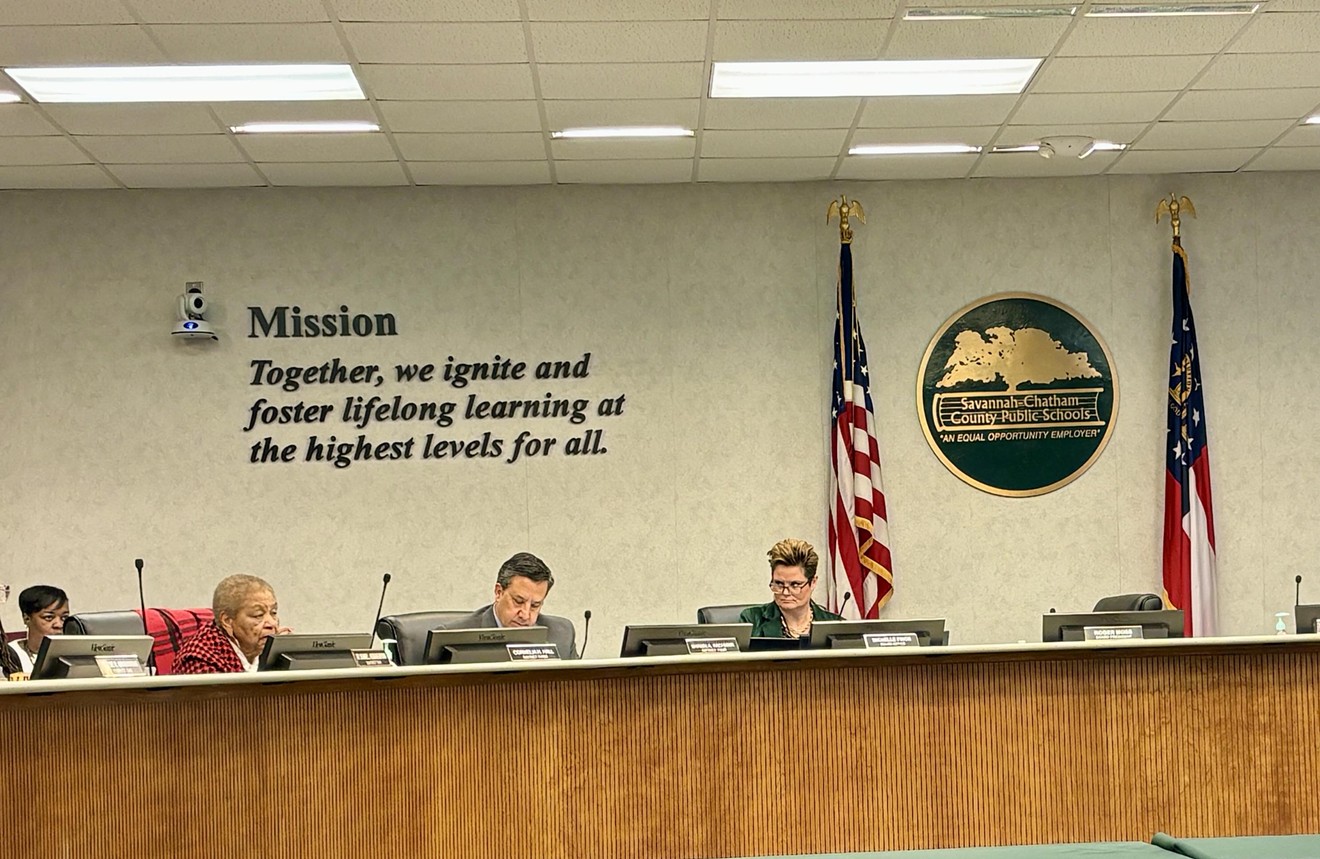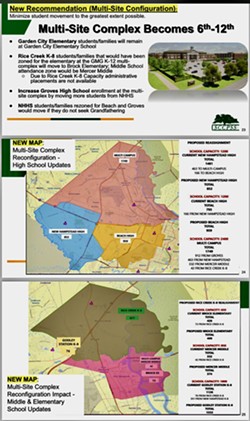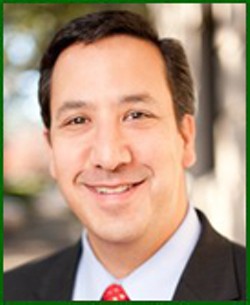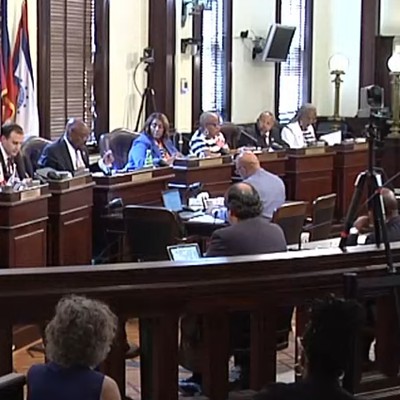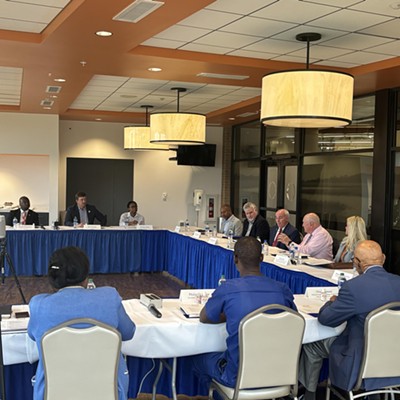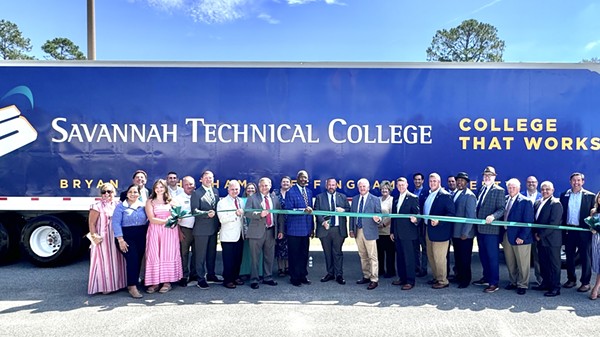The Board of Education during a Nov. 10, 2023 regular board meeting.
CHANGE, DISCOMFORT AND COMPROMISE: SCCPSS takes on rezoning issues as population shifts, schools overcrowded or underutilized
[
{
"name": "Air - MedRect Combo - Inline Content 1",
"component": "14680855",
"insertPoint": "7",
"requiredCountToDisplay": "5",
"parentWrapperClass": "fdn-ads-inline-content-block"
},{
"name": "Air - MedRect Combo - Inline Content 2",
"component": "14680856",
"insertPoint": "15",
"requiredCountToDisplay": "9",
"parentWrapperClass": "fdn-ads-inline-content-block"
},{
"name": "Air - SVP - Leaderboard - Inline Content - 2",
"component": "16852291",
"insertPoint": "10",
"requiredCountToDisplay": "10",
"parentWrapperClass": "fdn-ads-inline-content-block"
},{
"name": "Air - SVP - Leaderboard - Inline Content - 3",
"component": "16852292",
"insertPoint": "20",
"requiredCountToDisplay": "18",
"parentWrapperClass": "fdn-ads-inline-content-block"
},{
"name": "Air - SVP - Leaderboard - Inline Content - 1",
"component": "16852290",
"insertPoint": "25",
"requiredCountToDisplay": "22",
"parentWrapperClass": "fdn-ads-inline-content-block"
}
]
For however many resources the Savannah-Chatham County Public School System (SCCPSS) has at its disposal, it will always be short a crystal ball.
So the school system is informed by available data, projections and analysis in planning for its needs in the future. SCCPSS Superintendent Denise Watts, Ed.D., said that as the county’s demographics, economics and business/industry landscapes change, so does public education.
“We have to keep up,” Watts said in an email to Connect Savannah. “This will create the need and willingness to change, and change can bring discomfort, but if we work to bring people along, listen and are willing to compromise, we can minimize resistance and frustration.”
Which in a way sums up the past three-plus months since the SCCPSS introduced to the public Phase I of its Long Range Facilities Plan for the 2024-25 school year and the Board of Public Education eventually gave approval to the updated recommendations by a 9-0 vote at its Jan. 10 regular session.
In between, there were plenty of lively discussions and quite a bit of pushback from discomforted stakeholders in impacted school communities – in person at school board sessions, parent planning meetings and town halls, and in emails.
School officials listened to the public’s input, and the plan was reworked with many changes.
Vanessa Miller-Kaigler, Deputy Superintendent of Operations, said public reaction to the final version was gratitude that they were heard and able to impact revisions.
“Emotions are there. We recognize that, but we took everything that we heard, everything that we received, and we immediately went back to the drawing board,” Miller-Kaigler said at a Jan. 11 press conference. “We always want to be good partners. While data is good, data is important, we’re making sure that we satisfy the customers that we serve, i.e. our students, our staff and our families.”
Watts called the plan “a win-win and effective compromise for our community” at the press conference.
“When we embarked on this journey, I knew it would be complicated from the technical aspect of it and I also knew there was a human side of it,” she wrote later in the email. “This process further emphasized for me the need to slow down and bring people along with you. When you do this, it actually ends up being a better outcome and builds trust for longer-term work that may be complex. This cannot be overstated.”
Details on Phase II of the long-range plan are expected in the spring, but more pressing was to pass a version of Phase I to fit into the timetable of preparations for the 2024-25 school year.
Phase I, with the description “immediate needs,” was tasked with seeking maximum efficiency of district resources. Specifically, facilities usage and improved (and logical) attendance zone configurations and transportation routes – which benefits instruction time when students arrive at their schools on schedule.
There would be no staff reductions, according to the plan. Another bottom line when it all added up: a projected savings of about $2.6 million over two years.
The school system had results of a facility condition assessment studying the ages and conditions of its buildings.
It had facts and figures on school enrollments so it could “right size” those over capacity and others underutilized.
“Having buildings that are overcrowded is not conducive to the learning process,” Miller-Kaigler said.
Watts said other criteria when determining recommendations were the safety and well-being of students and staff, and qualitative data like stakeholder input.
“When you are rezoning students and making changes to school facilities, it has an impact on students and families,” Watts wrote. “Because of the humanity of this, everything is negotiable except policy and law.”
Watts would like to keep the district in a “proactive, future-oriented position in everything we do,” so “we can’t wait and cling to the status quo.”
Growth to the west
As the local population shifts, the continued growth in western Chatham County has led to overcrowding in some schools.
New Hampstead High School (NHHS) was at 123-percent capacity (1,471 students for a 1,200 building) for enrollment recorded on Aug. 16, 2023. West Chatham Middle School was at 132 percent (1,118 for 850) and West Chatham Elementary was at 120 percent (781 for 650).
Rice Creek K-8 in Port Wentworth was at 118 percent (1,175 for 1,000).
The original recommendations announced Nov. 1 included New Hampstead K-8 moving students to Godley Station K-8. NHHS would send some students to Beach High.
These moves were not popular with several people who spoke at the Dec. 6 school board meeting, including a New Hampstead sophomore football player and his mother; a husband and wife with five children in the school district; and Rebecca Musgrove, parent of an NHHS student-athlete and president of the New Hampstead K-8 parent-teacher organization.
“They are like brothers,” Musgrove said of the football team. “These kids have a bond like no other, and to remove these kids in their last years of public school is causing emotional stress on many of our families.”
Representative Shawn Kachmar of District 4 thanked those who shared their concerns as well as those who called and emailed, then had a rebuttal.
“Nobody on this board or superintendent or staff is against anyone,” Kachmar said at the meeting. "No one is trying to hurt families or children. We’re trying to make difficult decisions in trying circumstances. So there’s been a balancing of lots of different issues. But I’ve seen some emails where, ‘Why are you punishing us? Why are you trying to come after us?’ – things like that are just not true. There are lots of complicated factors here that everyone is approaching with the best of intentions as far as I’ve seen.”
The plan’s final version had 166 NHHS students designated for a move to Beach and 463 to Groves High at the new Multi-Site Complex (still to be named) in Garden City.
Creating extra space in 2024 at western Chatham schools such as New Hampstead High allows them flexibility to better handle the expected population growth.
The plan responds to those seeking a way to stay at their current schools with a grandfathering option. Rising sophomores, juniors and seniors at New Hampstead High; and rising eighth-graders at New Hampstead K-8 and Rice Creek K-8, can continue at those schools if a parent provides transportation. This was an alternative that Musgrove and others asked for at the Dec. 6 meeting.
A high school student’s athletic eligibility is retained as long as he or she does not withdraw at any time, and rezoned students’ eligibility also is not impacted under Georgia High School Association (GHSA) bylaws.
Board member Michael Johnson, who represents District 7 in western Chatham, gave a big thumbs down to the original plan but had a different view after changes were made.
“I'm pretty sure that the rest of my board members know that when this plan first came out, I was probably the loudest antagonistic person when it came to this plan,” Johnson said at the Jan. 10 informal session.
“There have been a whole lot of different versions of this plan, and I have to agree with Mr. Kachmar that this is the best plan that we can do with what we have today. Is it perfect? No. Is any plan going to be perfect? No. Are you going to make everybody happy? No."
“However, this plan understands the history of the areas mainly affected in West Chatham, it understands grandfathering and puts that human element into the plan, and it shows that the district is willing to listen to the people it affects on a day-to-day basis. So, with that being said, even though if this was going to be voted on last month, I would have voted no, but due to the changes and due to the hard work of staff, I will be voting yes. and I hope the rest of my board members do as well.”
Rezoning Gould Elementary
The initial long-range plan displeased community members with children at Gould Elementary School on Pineland Drive in Savannah – and many were vocal about it.
Gould is at 130 percent (847 students for 650 capacity), according to Aug. 16, 2023 enrollment. An expected resolution to the issue, going back to 2019, was to move the students to the new Groves-Mercer-Gould (GMG) K-12 Complex under construction off Highway 21.
Instead, the plan announced at the November school board meeting would assign Gould students to closer facilities, Haven and Butler elementary schools and New Hampstead K-8. Breaking up Gould in this way, those in opposition argued, would be damaging to students, including the large population of English speakers of other languages (ESOL), particularly in the Hispanic community.
“We do not serve any ESOL students from other attendance zones,” Dual Language Immersion Program teacher Miriam Ralda said at the school board regular session on Nov. 1. “All of our students are a part of our local school community. They are a family and the plan that's been set before you is ripping a family apart.”
An immigrant advocacy group, Migrant Equity Southeast (MESE), also supported keeping the students at Gould, which has resources with a trained and experienced staff. MESE representatives spoke at school board sessions and at their community meeting in November.
The SCCPSS listened, but as Watts noted at public meetings, it’s a balancing act, with each new iteration having a domino effect on other schools. The school system also determined that students in ESOL programs are better served from their home schools than at a hub setup. The compromise: 493 students will remain at Gould, with 394 rezoned to New Hampstead K-8. The second group currently resides in the New Hampstead High School attendance zone, so there’s a conventional feeder system in place for their futures.
The GMG Complex lost its second G, for Gould, and will be renamed and reconfigured as a 6-12 designed to handle future needs.
“The Gould family said we want to stay where we are. We have the secret sauce here, it’s working,” Miller-Kaigler said. “So we had to, as the professionals on this, (ask) why would we upset the secret sauce? We’ll have to go in there and make some updates to the building. They have been living in the building. They wanted to remain where they are.”
Working together
Miller-Kaigler said it wasn’t the first time in her 31 years working in the school district that change didn’t go over well with some in the public, and that plans were later modified.
It’s a collaborative process with a lot of moving parts, school officials and board members said several times at meetings.
“If they are upset, my words to them are to trust us,” Miller-Kaigler said. “Bring it to us, let’s look at it, let’s talk about it.”
Not every family will be pleased, she said, but they’ll be heard.
“I’m not going to say we’ll be able to fix every one of them,” she said, “but we may be able to sit down with you and come up with an alternate solution for you and your family, because every family’s needs are different.”
It’s not as easy as building a new school in anticipation of population growth when housing subdivisions spring up or a manufacturing plant comes to the area – that takes years and financial resources.
For Watts, who moved to Savannah to start her post in June 2023, the education of the educator from working on the long-range plan will continue from Phase I to Phase II and beyond, she wrote in her email.
“I learned about the demographics, the history, the unique aspects of each school and community,” she wrote, “and most of all, I learned about the people and began building relationships with those that make up each school community.”
So the school system is informed by available data, projections and analysis in planning for its needs in the future. SCCPSS Superintendent Denise Watts, Ed.D., said that as the county’s demographics, economics and business/industry landscapes change, so does public education.
“We have to keep up,” Watts said in an email to Connect Savannah. “This will create the need and willingness to change, and change can bring discomfort, but if we work to bring people along, listen and are willing to compromise, we can minimize resistance and frustration.”
Which in a way sums up the past three-plus months since the SCCPSS introduced to the public Phase I of its Long Range Facilities Plan for the 2024-25 school year and the Board of Public Education eventually gave approval to the updated recommendations by a 9-0 vote at its Jan. 10 regular session.
In between, there were plenty of lively discussions and quite a bit of pushback from discomforted stakeholders in impacted school communities – in person at school board sessions, parent planning meetings and town halls, and in emails.
School officials listened to the public’s input, and the plan was reworked with many changes.
Vanessa Miller-Kaigler, Deputy Superintendent of Operations, said public reaction to the final version was gratitude that they were heard and able to impact revisions.
“Emotions are there. We recognize that, but we took everything that we heard, everything that we received, and we immediately went back to the drawing board,” Miller-Kaigler said at a Jan. 11 press conference. “We always want to be good partners. While data is good, data is important, we’re making sure that we satisfy the customers that we serve, i.e. our students, our staff and our families.”
Watts called the plan “a win-win and effective compromise for our community” at the press conference.
“When we embarked on this journey, I knew it would be complicated from the technical aspect of it and I also knew there was a human side of it,” she wrote later in the email. “This process further emphasized for me the need to slow down and bring people along with you. When you do this, it actually ends up being a better outcome and builds trust for longer-term work that may be complex. This cannot be overstated.”
Details on Phase II of the long-range plan are expected in the spring, but more pressing was to pass a version of Phase I to fit into the timetable of preparations for the 2024-25 school year.
Phase I, with the description “immediate needs,” was tasked with seeking maximum efficiency of district resources. Specifically, facilities usage and improved (and logical) attendance zone configurations and transportation routes – which benefits instruction time when students arrive at their schools on schedule.
There would be no staff reductions, according to the plan. Another bottom line when it all added up: a projected savings of about $2.6 million over two years.
The school system had results of a facility condition assessment studying the ages and conditions of its buildings.
It had facts and figures on school enrollments so it could “right size” those over capacity and others underutilized.
“Having buildings that are overcrowded is not conducive to the learning process,” Miller-Kaigler said.
Watts said other criteria when determining recommendations were the safety and well-being of students and staff, and qualitative data like stakeholder input.
“When you are rezoning students and making changes to school facilities, it has an impact on students and families,” Watts wrote. “Because of the humanity of this, everything is negotiable except policy and law.”
Watts would like to keep the district in a “proactive, future-oriented position in everything we do,” so “we can’t wait and cling to the status quo.”
Growth to the west
As the local population shifts, the continued growth in western Chatham County has led to overcrowding in some schools.
New Hampstead High School (NHHS) was at 123-percent capacity (1,471 students for a 1,200 building) for enrollment recorded on Aug. 16, 2023. West Chatham Middle School was at 132 percent (1,118 for 850) and West Chatham Elementary was at 120 percent (781 for 650).
Rice Creek K-8 in Port Wentworth was at 118 percent (1,175 for 1,000).
The original recommendations announced Nov. 1 included New Hampstead K-8 moving students to Godley Station K-8. NHHS would send some students to Beach High.
These moves were not popular with several people who spoke at the Dec. 6 school board meeting, including a New Hampstead sophomore football player and his mother; a husband and wife with five children in the school district; and Rebecca Musgrove, parent of an NHHS student-athlete and president of the New Hampstead K-8 parent-teacher organization.
“They are like brothers,” Musgrove said of the football team. “These kids have a bond like no other, and to remove these kids in their last years of public school is causing emotional stress on many of our families.”
Representative Shawn Kachmar of District 4 thanked those who shared their concerns as well as those who called and emailed, then had a rebuttal.
“Nobody on this board or superintendent or staff is against anyone,” Kachmar said at the meeting. "No one is trying to hurt families or children. We’re trying to make difficult decisions in trying circumstances. So there’s been a balancing of lots of different issues. But I’ve seen some emails where, ‘Why are you punishing us? Why are you trying to come after us?’ – things like that are just not true. There are lots of complicated factors here that everyone is approaching with the best of intentions as far as I’ve seen.”
The plan’s final version had 166 NHHS students designated for a move to Beach and 463 to Groves High at the new Multi-Site Complex (still to be named) in Garden City.
Creating extra space in 2024 at western Chatham schools such as New Hampstead High allows them flexibility to better handle the expected population growth.
The plan responds to those seeking a way to stay at their current schools with a grandfathering option. Rising sophomores, juniors and seniors at New Hampstead High; and rising eighth-graders at New Hampstead K-8 and Rice Creek K-8, can continue at those schools if a parent provides transportation. This was an alternative that Musgrove and others asked for at the Dec. 6 meeting.
A high school student’s athletic eligibility is retained as long as he or she does not withdraw at any time, and rezoned students’ eligibility also is not impacted under Georgia High School Association (GHSA) bylaws.
Board member Michael Johnson, who represents District 7 in western Chatham, gave a big thumbs down to the original plan but had a different view after changes were made.
“I'm pretty sure that the rest of my board members know that when this plan first came out, I was probably the loudest antagonistic person when it came to this plan,” Johnson said at the Jan. 10 informal session.
“There have been a whole lot of different versions of this plan, and I have to agree with Mr. Kachmar that this is the best plan that we can do with what we have today. Is it perfect? No. Is any plan going to be perfect? No. Are you going to make everybody happy? No."
“However, this plan understands the history of the areas mainly affected in West Chatham, it understands grandfathering and puts that human element into the plan, and it shows that the district is willing to listen to the people it affects on a day-to-day basis. So, with that being said, even though if this was going to be voted on last month, I would have voted no, but due to the changes and due to the hard work of staff, I will be voting yes. and I hope the rest of my board members do as well.”
Rezoning Gould Elementary
The initial long-range plan displeased community members with children at Gould Elementary School on Pineland Drive in Savannah – and many were vocal about it.
Gould is at 130 percent (847 students for 650 capacity), according to Aug. 16, 2023 enrollment. An expected resolution to the issue, going back to 2019, was to move the students to the new Groves-Mercer-Gould (GMG) K-12 Complex under construction off Highway 21.
Instead, the plan announced at the November school board meeting would assign Gould students to closer facilities, Haven and Butler elementary schools and New Hampstead K-8. Breaking up Gould in this way, those in opposition argued, would be damaging to students, including the large population of English speakers of other languages (ESOL), particularly in the Hispanic community.
“We do not serve any ESOL students from other attendance zones,” Dual Language Immersion Program teacher Miriam Ralda said at the school board regular session on Nov. 1. “All of our students are a part of our local school community. They are a family and the plan that's been set before you is ripping a family apart.”
An immigrant advocacy group, Migrant Equity Southeast (MESE), also supported keeping the students at Gould, which has resources with a trained and experienced staff. MESE representatives spoke at school board sessions and at their community meeting in November.
The SCCPSS listened, but as Watts noted at public meetings, it’s a balancing act, with each new iteration having a domino effect on other schools. The school system also determined that students in ESOL programs are better served from their home schools than at a hub setup. The compromise: 493 students will remain at Gould, with 394 rezoned to New Hampstead K-8. The second group currently resides in the New Hampstead High School attendance zone, so there’s a conventional feeder system in place for their futures.
The GMG Complex lost its second G, for Gould, and will be renamed and reconfigured as a 6-12 designed to handle future needs.
“The Gould family said we want to stay where we are. We have the secret sauce here, it’s working,” Miller-Kaigler said. “So we had to, as the professionals on this, (ask) why would we upset the secret sauce? We’ll have to go in there and make some updates to the building. They have been living in the building. They wanted to remain where they are.”
Working together
Miller-Kaigler said it wasn’t the first time in her 31 years working in the school district that change didn’t go over well with some in the public, and that plans were later modified.
It’s a collaborative process with a lot of moving parts, school officials and board members said several times at meetings.
“If they are upset, my words to them are to trust us,” Miller-Kaigler said. “Bring it to us, let’s look at it, let’s talk about it.”
Not every family will be pleased, she said, but they’ll be heard.
“I’m not going to say we’ll be able to fix every one of them,” she said, “but we may be able to sit down with you and come up with an alternate solution for you and your family, because every family’s needs are different.”
It’s not as easy as building a new school in anticipation of population growth when housing subdivisions spring up or a manufacturing plant comes to the area – that takes years and financial resources.
For Watts, who moved to Savannah to start her post in June 2023, the education of the educator from working on the long-range plan will continue from Phase I to Phase II and beyond, she wrote in her email.
“I learned about the demographics, the history, the unique aspects of each school and community,” she wrote, “and most of all, I learned about the people and began building relationships with those that make up each school community.”

